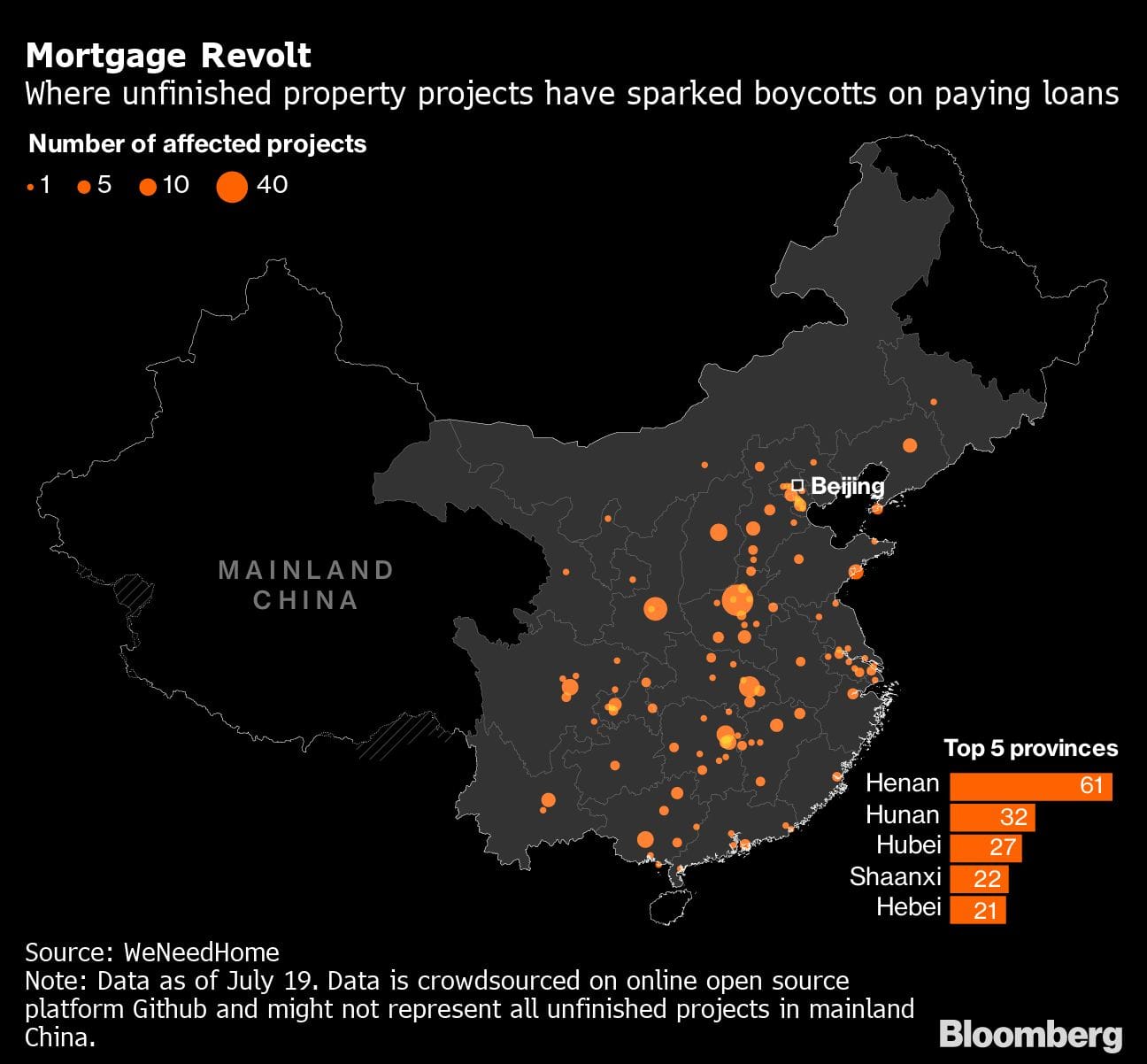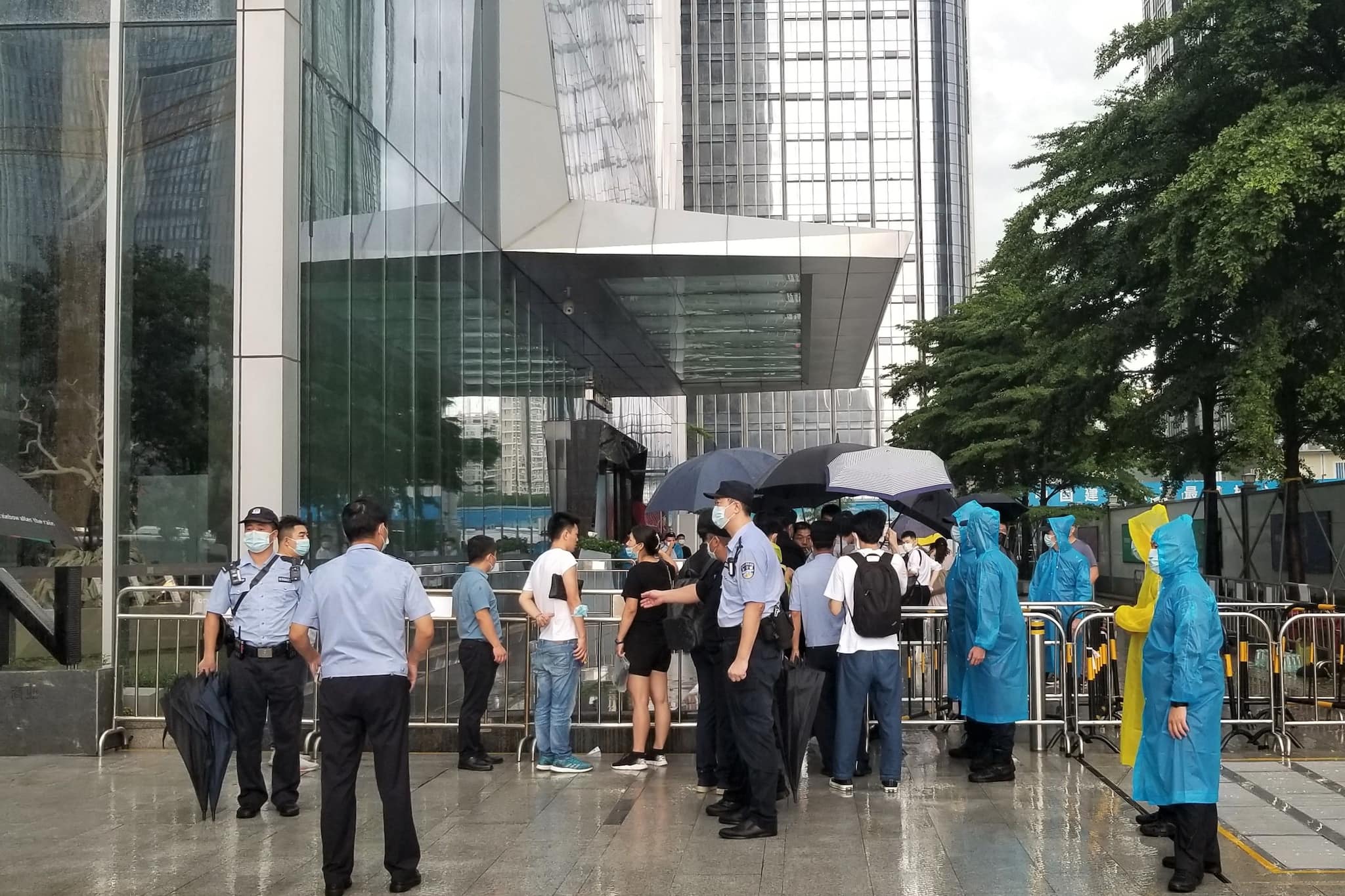



Over the past few years, President Xi Jinping has reined in China’s biggest tech companies, stamped out democracy in Hong Kong and locked down 26 million people in Shanghai to eliminate Covid cases.
Yet he now faces a surprise challenge from middle-class homeowners who are watching their family wealth slip away with a sustained slide in the property market, which makes up a fifth of China’s economic activity.
Some 70 percent of household wealth in China is tied up in property, far more than in the US, making it one of the most sensitive political issues for the Communist Party.
For months Xi has stood firm in reining in over-leveraged Chinese developers, spurring a record wave of defaults that spooked global investors and brought at least 24 leading property companies to the brink of collapse. In the process, more than $80 billion has been wiped from its offshore bond market.
But now ordinary Chinese people are publicly revolting, with rapidly escalating boycotts on mortgage payments spread across at least 301 projects in about 91 cities. These homeowners accuse developers of failing to deliver apartments they’ve already paid for: the value of mortgages that could be affected has swelled to an estimated 2 trillion yuan ($297 billion).

“Chinese homebuyers usually pool the whole family’s resources to buy a home,” said Alfred Wu, an associate professor at the National University of Singapore’s Lee Kuan Yew School of Public Policy.
“It is a life-and-death matter for them if their homes become negative assets.”
For Xi, the timing couldn’t be worse: He’s just months away from a once-in-five-years Communist Party meeting, at which he’s expected to secure a third term in office. Moreover, he’s also expected to trumpet his policies as beneficial to achieving “common prosperity” for average citizens, part of the social contract that underpins the legitimacy of one-party rule in China.
Already, signs are emerging that Xi will seek to ease the pain. Bloomberg reported Monday that China may allow homeowners to temporarily halt mortgage payments on stalled projects without incurring penalties, as part of a broader push to stabilise the market that includes urging local governments and banks to plug funding shortages at developers.
“It’s the first time we’ve seen this type of mortgage boycott in China and it’s clearly caught Beijing’s eye,” said Chi Lo, senior Asia Pacific investment strategist at BNP Paribas Asset Management.
“It’s crucial that Xi preserves stability before the 20th party congress.”
While the boycotts only affect a small portion of combined mortgage portfolios, the swift escalation of the protests have sparked fears that broader discontent could flare over falling prices and stalled projects.
Even if a short-term solution is found, longer-term risks remain for Xi. The 69-year-old leader is seeing unusually widespread social discontent as he looks to clamp down on excessive debt while also seeking to eliminate Covid-19 cases, putting the economy on pace to fall well short of a 5.5 percent annual growth target.
China has seen a spate of online protests over social issues in recent months, including an uptick in links to the pro-democracy anthem “Do You Hear the People Sing?” from Les Miserables during the Shanghai lockdown.
The case of a mother of eight found chained by the neck sparked public outcry over the trafficking of women, and months later footage of a violent attack on female diners at a restaurant triggered another outpouring of anger at local authorities.
 Police officers and security guards at the China Evergrande Group headquarters in Shenzhen in Sept. 2021 following mounting protests by homebuyers.
Police officers and security guards at the China Evergrande Group headquarters in Shenzhen in Sept. 2021 following mounting protests by homebuyers.
Many protests in China are “strategically self-limiting” to achieve a specific outcome, like recent demonstrations over a suspected billion-dollar financial scam in the central province of Henan that allowed some victims to recoup their money, according to Zixue Tai, an associate professor at the University of Kentucky who has researched social activism in China. Still, he called the spate of unrest “some sort of spontaneous release of pent-up popular rancor with the Xi administration.”
“Not directly confronting the national regime has allowed these protests to continue up to this point,” Tai said. “From the perspective of the national government, it is probably safer to let the general public vent it out to a permissible degree than suppressing citizens’ voices.”
China’s property market poses unique systemic risks. Once called “the most important sector in the universe,” the real estate industry is now reeling under a clampdown initially aimed at a handful of debt-saddled borrowers like China Evergrande Group. As more firms collapse, pressure is growing on banks that prop up the industry and local governments who rely on land sales for revenue.
Local governments are likely to be asked to step in and provide support, through taking minority stakes in projects and raising funds through special-purpose bonds, according to Travis Lundy, an Asia markets veteran and independent analyst on the investor research platform Smartkarma, who has studied Chinese property companies in depth.
Authorities have repeatedly emphasized the need to deliver homes to buyers, even as record delinquencies brought the real estate sector to its knees. But the majority of boycotted loans are tied to projects from builders that have defaulted, according to data compiled by CLSA, which estimates that Evergrande alone accounted for 35% of the total.
“If thousands of homeowners believe that their largest asset is in trouble, they could protest as individuals across China, creating a ‘systemic’ political crisis,” said Andrew Collier, a managing director at Orient Capital Research Inc.
The central bank is “dodging between support for the property industry and isolated acts of pain to curtail the property bubble,” he added. “It’s a dangerous dance.”
Discover the latest Business News, Sensex, and Nifty updates. Obtain Personal Finance insights, tax queries, and expert opinions on Moneycontrol or download the Moneycontrol App to stay updated!
Find the best of Al News in one place, specially curated for you every weekend.
Stay on top of the latest tech trends and biggest startup news.